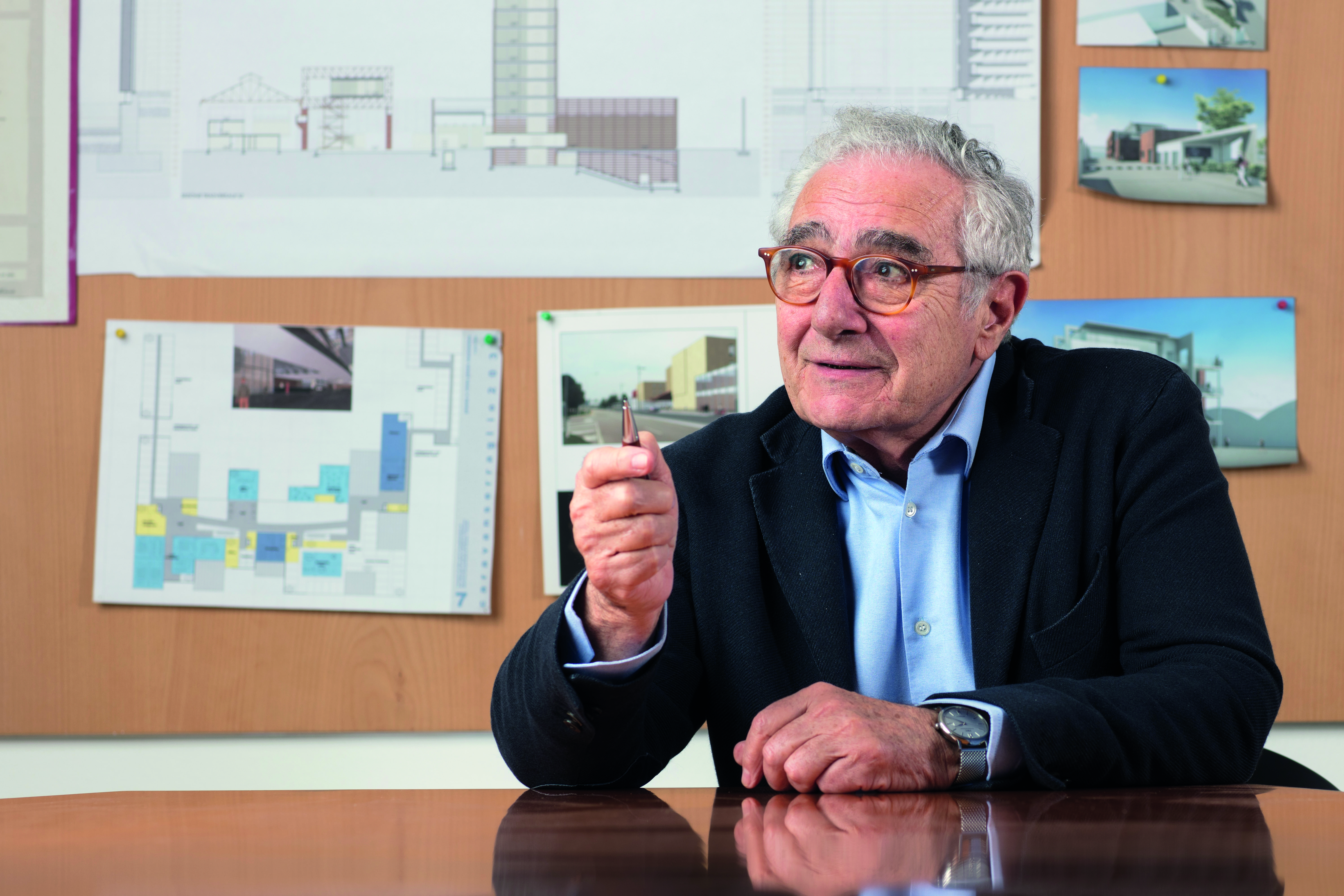
With a career in the foodservice industry spanning 50 years, interviewing Antonio Montanari FFCSI offers a unique perspective of how the world of food and hospitality in Italy has evolved from the end of the 1960s to the present.
In 1968, when he founded his architectural and engineering firm SMP (Studio Montanari & Partners) – one year after graduating in architecture from the Polytechnic University of Milan – a foodservice sector in Italy simply didn’t exist. “There was this huge contradiction,” says Montanari. “Thanks to pizza and pasta, Italians were considered the kings of the kitchen. In fact, we were very backward. The predominant attitude was that, in order to design a commercial kitchen you just needed to know how to cook, and the rest would follow naturally.”
Instead, he adopted a completely different approach. For him, form and function had to be integrated early on, from the design and planning phase. “Back then, the hospitality sector refused to acknowledge that building a catering facility was a project on its own,” says Montanari. “As a foodservice consultant, I became involved in projects when the architectural design was already complete, which was too late. For example, I remember being called to set up the kitchen of a medium-sized hospital, but it was immediately clear that the size and the way the space was organised were completely inadequate.”
Birth of foodservice
Specialising in food and hospitality happened to him partly by accident – his first project was a hotel – partly by design. “From 1967 to 1975, I started to discover the world of food as something to be studied and understood, not something to be taken for granted,” he says.
However, his natural inclination, to focus on a specific sector, went against the grain of the thinking back then. “At the academic and cultural levels, there was this idea that a good architect had to be able to do everything,” says. “Being specialised was seen almost as something negative.”
Montanari was particularly interested in the public and the commercial catering sectors, with their different needs and ways to solve the problem of feeding many people. Of the two the public side had more pressing needs, so it was forced to innovate more rapidly. Nowadays, all schools, hospitals and universities provide food to patients, students and staff. It hasn’t always been like that, though. “At the time, patients in hospitals had to rely on their families to bring food from home,” he says. “Now, a city like Milan provides meals to 90,000 school children every day.”
The private side on the other hand, was lagging behind, “still stuck on the idea of the osteria Toscana and pizzeria Napoletana, as the greatest expressions of catering,” explains Montanari.
The mental shift in Italy was slow, so innovation came later than in other countries. When it finally happened, things changed dramatically. As a result a modern food sector was born, with the first large projects and food safety regulations. Montanari was both a witness and an active contributor to this change.
Three factors of innovation
The push to modernisation came from three directions. One was the Michelin-starred chef Gualtiero Marchesi, who passed away recently and is considered the founder of modern Italian cuisine.
In 2004, Marchesi also founded Alma, The International School of Italian Cuisine. “I had the opportunity to teach at Alma about 10 years ago,” says Montanari. “Thanks to Marchesi, I discovered new and innovative cooking methods and new ways of presenting food.”
The second major contribution came from Carlo Petrini, the founder of the Slow Food movement in Italy in 1989. “Petrini went back to the three main qualities of what food should be like: good, clean and right,” says Montanari. “His holistic philosophy made me discover a different approach to food and the world of catering. It’s something I still believe in and have practiced until today.”
Finally, the third major push for innovation came from McDonald’s, which is often considered all that’s wrong with the commercialisation of food. The chain opened its first restaurant in Italy in 1985 in Bolzano, and the year after in Rome. In the mid-1990s it expanded in Milan, after acquiring the Italian fast-food chain Burghy.
Montanari worked with McDonald’s on two of their restaurants in Milan. His recollection of that experience explains the contradiction of a fast food chain being a factor of progress. “At the time, nobody in Italy would design a restaurant in such a scientific way,” he says. “Every single part: lighting, equipment, air conditioning, interiors, walls, tables etc was designed with a single focus on customers and product quality. It was a very important experience as it highlighted the backwardness of the rest of the restaurant sector.”
Eating out today
Society wasn’t immune to change either. “In those years, the weekend was born, in the sense of sociological phenomenon, and ‘eating out’ became an important part of it,” explains Montanari. “The concept of eating out is always present now, even when we eat at home. Most of the food we buy every day, from frozen pizzas to pre-washed lettuce, is prepared away from home.”
The popularity of celebrity chefs is another sign of our times, but not for the reason we would assume. “Rather than teaching people how to cook, they promote food and the concept of eating,” says Montanari. “Nobody cooks at home anymore.”
Eating Out (Mangiare Fuori) is the title of Montanari’s first book. It was published in 2008 and talks about the methods and techniques of the restaurant sector. At the time of our interview he’s working on the second one. In this one he explains what happens behind the food we eat. “Imagine ordering a steak at a restaurant,” he says.
“The idea is not to explain how it was cooked, but the logical process happening in the background, which brought that steak to our plate.”
The food industry and the world of food in general have come a long way, going through what Montanari calls an “evolution-revolution”. This change was very positive, but it also created a certain lack of balance: “The media is obsessed with food,” he says. “How long will it last? I don’t have an answer for that. The problem is that food is loaded with all sorts of values and meanings. Finding a balance in this ‘everything ’ won’t be easy – it’s what Petrini has been trying to do for years – but I think it will happen eventually.”
To explain his optimistic view, he uses the wine industry as an example. “After going through several crises, it finally found a balance. Ironically enough, now Italians are drinking less wine, the sector is thriving,” he explains.
As far as foodservice is concerned, this evolution-revolution solves old problems but seems to have brought about new ones. Overall, there is much more awareness of the importance of an integrated approach, but the sector seems to suffer from the same distinct lack of balance. “There is the tendency to either dismiss its importance altogether, or to expect too much from it,” says Montanari.
The academic experience
The birth of food technology and gastronomic sciences as independent academic disciplines was another welcome consequence of the modernisation process. “For a long time, the world of food was the domain of four traditional faculties: medicine, veterinary, agriculture and pharmacology,” he explains.
In the last thirty years, Montanari has been quite active in this field too, as a teacher for different academic institutions. Since 2006, he has worked as adjunct professor at the University of Gastronomic Sciences founded by Slow Food in Pollenzo, near Turin.
This relatively new field of studies is filling an important gap. “There is a strong need for specialised professionals in the food industry, and not only for the restaurant sector. Hotel chains for example, feed as many people as restaurant chains,” he says.
Raising the bar for FCSI Italy
In 2017, Montanari became part of FCSI’s Council of Fellows, reserved for members who have made an extraordinary contribution to the society. He received this recognition not only because he was one of the founders of the FCSI Italian unit in 2004, but for many reasons, as president of FCSI Italy, Massimo Giubilesi FCSI, explains: “Antonio was a major driver in the Italian unit.
He was the spark that pushed us to raise the bar, to go back to fundamentals and invest in people. He’s always been optimistic about this change, and even when not directly involved, he would have a positive influence.
Andrea Tolu




